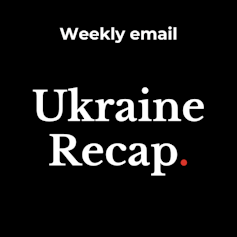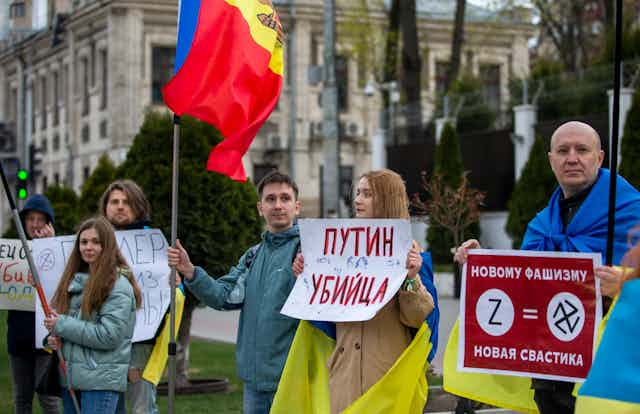It feels as if there has been an added whiff of danger about the conflict in Ukraine this week, which – for the first time since the Russian military crossed the border two months ago – threatens to go beyond Ukraine into neighbouring countries and, perhaps, Russia itself.
A series of fires at oil depots inside Russia have been reported as possible acts of Ukrainian sabotage, while in the breakaway Moldovan region of Transnistria, attacks on a security agency building in the region’s capital, Tiraspol, and on a military unit in a village just outside Tiraspol, were blamed by an official on Ukrainian “infiltrators”. For its part, Ukraine says this is clearly a “false flag” operation which could be used by Moscow as an excuse to extend the conflict to Moldova.
This followed a statement on Friday April 22 about Russia’s aims for “stage two” of its war, by top Russian general, Rustam Minnekayev. He said that Russia would aim to occupy and control the south and east of the country, blocking Ukraine’s access to the Black Sea and providing “another way out to Transnistria, where there are also cases of oppression of the Russian-speaking population”.
Stefan Wolff, an expert in Russian politics based at the University of Birmingham, who has spent a great deal of time in Moldova, and Tatyana Malyarenko, an expert in international affairs at the University of Odesa, which would find itself cut off by Russia’s stage two plans, write that establishing a “bridge” across southern Ukraine would leave Moldova wide open to Russian aggression. It would also put pressure on Nato, with which the country has a “cooperation agreement”.
Read more: Ukraine invasion: 'stage two' of Russia's war is ringing alarm bells in nearby Moldova – here's why
The conflict spilled over into Poland and Bulgaria as well this week, when Russian energy giant Gazprom turned off the gas taps in response to the countries’ refusal to pay for their gas in roubles. This is a potentially ominous sign of things to come, as much of western Europe also gets its gas from Russia and would be vulnerable to similar moves at the behest of the Russian government.
Economist Alexander Mihailov writes that with the help of their neighbours and allies, both countries will probably be able to manage without Russian gas, at least in the short-term. And the move will give renewed urgency to Europe’s determination to wean itself off Russian oil and gas.
Read more: Why Bulgaria and Poland can withstand Russia cutting off their gas supply

This is our weekly recap of expert analysis of the Ukraine conflict.
The Conversation, a not-for-profit news group, works with a wide range of academics across its global network to produce evidence-based analysis. Get these recaps in your inbox every Thursday. Subscribe here.
Meanwhile, outside Ukraine
Elsewhere in Europe, we read about the French election at the weekend in which the centre-right incumbent, Emmanuel Macron, saw off a serious challenge from his far-right opponent Marine Le Pen. Despite trying to distance herself and her party from Moscow in the run-up to the election, Le Pen’s manifesto was committed to ending France’s military dependency on the US and forming “an alliance with Russia”. Similarly the leader of Hungary, Viktor Orbán, was reelected at the beginning of April, despite is oft-declared admiration for the Russian leader.
Toby Greene, an international affairs expert from Bar-Ilan University in Israel believes that for many on the right, Russia and its regime are likely to retain their attraction as an “irreplaceable pole” for anyone resistant to a liberal internationalist agenda dominated by the US.
Read more: Ukraine: will Putin's war alienate his many admirers on Europe's far right?
Another country deeply divided over how it feels about the war is America itself, where the incumbent president, Joe Biden, believes that Putin should be tried as a war criminal, while his predecessor, Donald Trump thinks the Russian president is a genius for invading Ukraine to exploit what he sees as Washington’s weakness.
Liam Kennedy, a professor of American Studies at University College in Dublin, is interested in the fascination with the war in Ukraine in the US, a country where people usually take little notice of what’s going on beyond their borders.
Read more: Ukraine: a divided America seeks moral clarity in a war against democracy
While much has been written about the plight of refugees fleeing the violence and the displaced and dispossessed both inside Ukraine and in neighbouring countries, the plight of hundreds of seafarers trapped in commercial ships for the past several months has gone mostly unnoticed. International law experts Leïla Choukroune and Elizabeth Mavropoulou write that these are largely the crews of ships stranded in Black Sea ports such as Mariupol, Kherson and Odesa, some of which have been attacked by Russian naval vessels, despite being non-combatants.
So far there appears to have been no progress in establishing safe escape routes for these sailors, but attacking them or their vessels is a war crime, write Choukroune and Mavropoulou.
The diplomatic front
At the very beginning of this conflict, the day after the Russian military crossed into Ukraine, the United Nations Security Council drafted a resolution condemning Russia and calling in Moscow to withdraw. Predictably Russia, one of the five permanent members of the Security Council (P5) vetoed the resolution. So that was that.

But this week, at long last, the UN took the first step to dealing with its “veto problem”, passing a procedural resolution which will henceforth require a P5 member to appear and justify its use of the veto. UN experts Emma McClean and Aidan Hehir say that while this will not necessarily deter countries from wielding their vetoes in future, it will at least add to the embarrassment factor of having to go on the record to the rest of the world as to why they have done so.
Read more: Ukraine: UN takes a step towards addressing 'veto problem' which stopped it condemning Russia
When it comes to arguing its case to the international community, Russia, meanwhile, appears as isolated as ever. This week foreign minister Sergei Lavrov hosted his Eritrean counterpart Osman Saleh in Moscow. The smiles and handshakes couldn’t mask the fact that Eritrea is one of only four countries to vote with Russia against the UN’s condemnation of the war.
The irony of this is that it was Russia’s fear of being isolated on the edge of a group of increasingly pro-western former Soviet bloc countries that led it to meddle in Ukrainian politics in the first place. Anna-Sophie Maass, an expert in international relations and diplomacy, says the the events of the past two months have left Moscow more isolated than ever.
Read more: Russia's long journey from partner of the west to pariah reflects a huge failure of its diplomacy
Finally, do make time to listen to our podcast, the Conversation Weekly. This week’s episode looks at the effect the war is likely to have on international cooperation in space and features interviews with two leading thinkers in that field, Kuan-Wei Chen and Svetla Ben-Itzhak. It’s well worth your time.
Ukraine Recap is available as a weekly email newsletter. Click here to get our recaps directly in your inbox.

